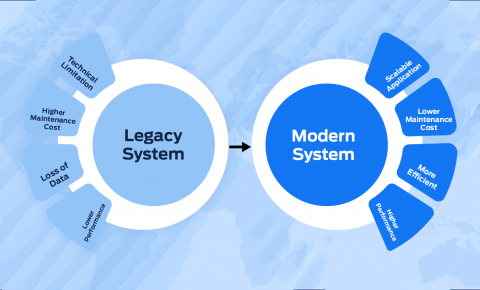Products Catalogs & Keywords:

"Legacy system modernization refers to the process of upgrading or transforming existing legacy systems to overcome their limitations and align them with modern technology standards. Here are some key uses and benefits of legacy system modernization uses:
Enhanced Performance and Scalability: Modernizing legacy systems can improve their performance, allowing them to handle larger data volumes and increased user loads more efficiently. By leveraging modern technologies, such as cloud computing or optimized databases, organizations can achieve better scalability and responsiveness, leading to improved system performance.
Improved Integration and Interoperability: Legacy system modernization enables better integration with modern applications, third-party services, and emerging technologies. By adopting standardized interfaces and APIs, organizations can streamline data exchange, automate workflows, and facilitate seamless integration with other systems, enabling a more connected and efficient IT landscape.
Enhanced User Experience: Modernizing legacy systems can result in a more intuitive and user-friendly interface, improving the overall user experience. By redesigning outdated user interfaces and workflows, organizations can boost user productivity, reduce training time, and increase user satisfaction, leading to higher adoption rates and improved employee efficiency.
Cost Reduction: Legacy system modernization can help reduce long-term costs associated with maintaining and supporting outdated systems. By eliminating the need for obsolete hardware, software, or specialized expertise, organizations can achieve cost savings. Modernization efforts can also optimize system resources, reduce downtime, and minimize the need for extensive customizations or workarounds, resulting in lower maintenance and support costs.
Increased Security and Compliance: Legacy system modernization addresses security vulnerabilities associated with outdated technology. By migrating to more secure platforms, implementing robust security measures, and adopting modern encryption standards, organizations can enhance data protection, mitigate risks, and ensure compliance with industry regulations and data privacy laws.
Business Agility and Innovation: Legacy system modernization enables organizations to adapt quickly to changing business requirements and leverage emerging technologies. By modernizing systems, organizations can introduce new features, support innovative business processes, and facilitate digital transformation initiatives. This agility allows businesses to stay competitive, seize new opportunities, and deliver improved products and services to customers.
Data Accessibility and Analytics: Modernizing legacy systems can unlock valuable data stored within these systems, making it accessible for advanced analytics and business intelligence. By integrating legacy systems with modern data analytics platforms, organizations can gain deeper insights, make data-driven decisions, and uncover actionable trends or patterns that can drive business growth.
Extending the System's Lifespan: Legacy system modernization can extend the life of existing systems, postponing the need for a complete system replacement. By gradually modernizing components, adding new functionalities, and aligning with modern architecture, organizations can maximize their return on investment and leverage the existing business logic and data while incrementally moving toward a more modern technology landscape.
Overall, legacy system modernization enables organizations to overcome the limitations of outdated systems, improve efficiency, reduce costs, enhance security, and leverage new opportunities presented by evolving technologies, ultimately ensuring their long-term viability and competitiveness in the rapidly changing business environment.
Source URL: - https://itechindia.co/us/blog/what-is-the-real-cost-of-maintaining-legacy-systems/
